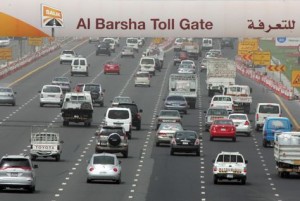By Shane McGinley www.arabianbusiness.com
Dubai’s Roads and Transport Authority (RTA) has refused to comment on media reports it plans to add two Salik toll gates to the city’s roads, bringing the total number in the emirate to six.

The gates, which charge drivers AED4 each time they pass through, were launched in July 2007 under a plan to cut down congestion on Dubai’s roads.
However, traffic in the city is nowhere near the levels seen at the height of the oil and property-led boom in 2007 and 2008, when cars regularly got stuck in traffic jams.
Emails and calls by Arabian Business to the RTA went unanswered.
The report prompted a flurry of responses from Dubai-based Twitterers, who branded the move a stealth tax aimed at generating revenues from motorists.
“I just heard about those new Salik toll gates. I guess they want to drive us back in recession,” posted Djvendettadxb.
“It was implemented to help or to rob people?” tweeted Zzoher.
Philippe Dauba Pantanacce, senior economist at Standard Chartered Bank, said the road tolls formed a vital part of government cashflow.
“Salik is an indirect tax through a toll system and in a country where there is no direct taxation, except in a few circumstances, any source of revenue is better than nothing,” he told Arabian Business. “It is also much more reliable than hydrocarbon revenues for example.
“If you look at 2008, when oil prices were very high, hydrocarbon revenues were higher than the taxes and customs revenues. But, in 2009, when the oil prices plunged, taxes and custom revenues were 1.5 times higher than hydrocarbon revenues. So this can’t be neglected,” he said.
The global financial crisis has put increased financial pressure on Dubai, which has an estimated debt load of $115bn or 123 percent of GDP. The city relies on fees and taxes for around 77 percent of its budget revenue.
The RTA last year earned around AED800m ($217m) from Salik, up from AED776m in 2009 and AED669m in 2008.
Dhahi Khalfan Tamim, the emirate’s police chief, said in January the government might look to raise road tolls but would stop short of introducing direct taxes.
“There will be no taxes at all. If necessary [raise the] Salik [toll]. Not for income, but to solve the heavy traffic problems,” he said.
The RTA has struggled to secure funding for its infrastructure pipeline in the wake of the downturn, delaying key projects such as the expansion of the Dubai Metro lines.
In January, Arabian Business reported the agency would seek private funding for almost a third of its large projects over the next five years, in a bid to spread the cost and risk.
The RTA is also considering the privatisation of some of its services, such as water taxis.


















